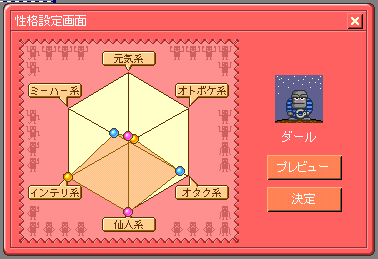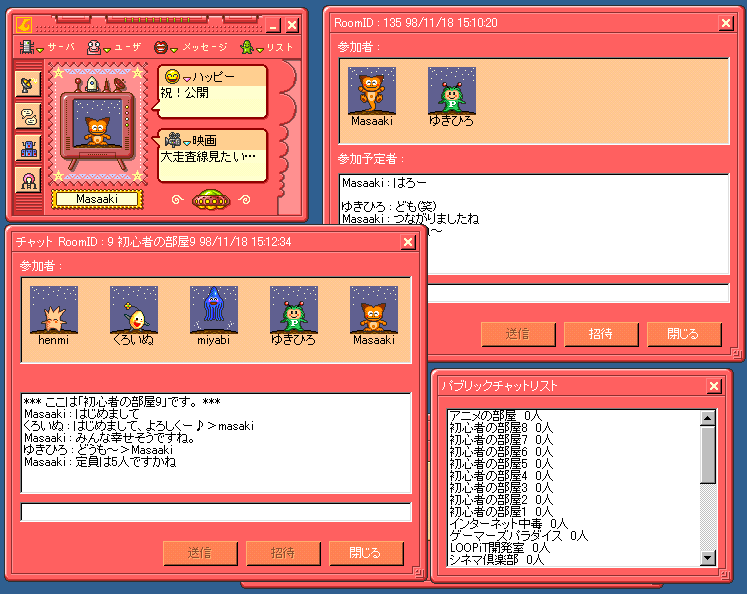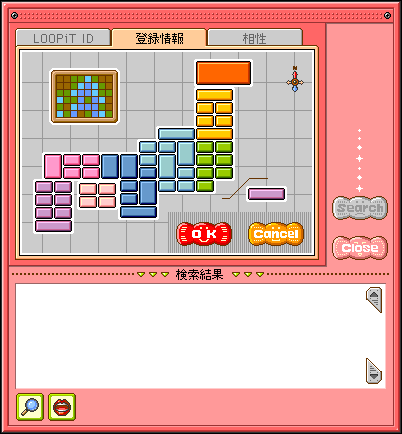


 About LOOPiT
About LOOPiT
LOOPiT was a Japanese Instant Messenger client with a very distinct visual style and a heavy emphasis on avatar characters that reflected the personality profiles of its users.
As opposed to picking or changing their avatar manually from a list, users were assigned characters based on their personality. It's said that your character, or "alter ego", would change under the influence of the friends you'd chat with over time. In the official website's own words, "it will be influenced by the character of the person with whom you chat, and your character will change naturally." - though how exactly this worked is as of yet unclear.
The website also states that, over time, characters would be "upgraded" in some way - for example, on your birthday an event would occur for the character at that time, and its secret technique animation would change, and so on. Again, how exactly this worked or looked is as of yet unclear.
By the end of LOOPiT's existence, 19 characters were available in total.

LOOPiT had all the features one might expect from an Instant Messenger program - Public chatrooms, private messaging, leaving offline messages, saving logs, blocking undesirable users, and so on.
According to the LOOPiT Manual from the official website, there were public chat rooms dedicated to certain topics that users could join, though the maximum amount of users that could be in these rooms was 5. Whether this limit extended to the entirety of LOOPiT (including private chats) is as of yet unclear. It's also unclear if these rooms were hosted officially by LOOPiT or if they were user-made, though given the fact that there were voting competitions for the naming of public rooms hosted on the LOOPiT Website, they were likely official.
There were also contests to have user-designed characters appear in LOOPiT as possible avatars, though none of the images in the gallery were saved on the internet archive.
When in a chat with one or more other users, mousing over their characters would display their mood & current interest. Double-clicking another character would open a Private Chat with that user, and other users could be sent a guest invitation to join an existing chat.
The Friends List allowed users to organize their contacts into folders that they could add, rename and delete. Up to 32 users could be registered as friends, and it was possible to mass-send a message to every friend in a given folder.
Online friends' characters would animate, while offline friends would appear stationary.
Almost every version of the LOOPiT Beta that was released increased these limits to some degree.
Users could search for other like-minded chatters via the "compatibility search" feature. This would try to pair up users via use of a system somewhat like a mix between a horoscope and a personality test, with data based on the properties of their character.
Of course it was also possible to search manually for people that matched certain criteria. You could search by gender, age, location, keywords in users' mood/interest, or simply by LOOPiT ID. It was also possible to limit your search to specific prefectures of Japan.
Standard/guest members only had access to this search feature for a 2 week trial period unless they paid a fixed monthly subscription fee, while members of the JustNet internet service had full unrestricted use of the program. Full membership was referred to as "powerful service."
The website featured leaderboards ranking members of LOOPiT by their popularity (how many people added them to their friends list), how many times they "transformed" (how often they changed their character), and how much their personality changed from when they started.
The LOOPiT Store sold a handful of merchandise based on the program such as mugs, a mousepad featuring the LOOPiT logo, and several T-Shirts. The T-Shirts were shown being worn by people with life-sized masks of LOOPiT characters. While these masks were arguably the more interesting piece of merchandise, it appears they were never up for sale.
The most recent (and only) archived version of LOOPiT is 1.0b10.
 History
History
LOOPiT was created by IMJ Corporation and operated by JustNet in January 1999.JustNet was a Japanese Internet Service Provider that started as a personal computer communication service in March 1996, operated by JustSystems Corporation, a Japanese software development house founded in 1979.
On the first of October, 2001, So-net company announced plans to acquire JustNet from WebOnline Networks Ltd for 1.8 billion yen.
So-net is a Japanese Internet Service Provider established in 1995 and operated by Sony Network Communications Inc, a wholly owned subsidiary of Sony.
In September of 2001, So-net company purchased WebOnline Networks, the operating company of "JustNet" from JustSystems Corporation.
JustNet still operates under So-net at the time of this writing.
The LOOPiT service stopped accepting new downloads and member registrations as of February 21, 2002, and was completely discontinued on March 21, 2002. It never left Beta before closure.

 Characters
Characters 

This section is under construction.Information on the avatars, their names, descriptions, and animations will be added as it is uncovered.
 Decompiling LOOPiT
Decompiling LOOPiT
LOOPiT was made using Macromedia Director; Experimenting with different versions indicates it was most likely the "MX 2004" release.Director is no longer supported or provided by Macromedia (now Adobe) in any way shape or form as of February 1, 2017, for sale or otherwise. For the sake of legality, no links to Director or the serial keys required to run it will be linked to here, though it and its many versions are freely available on the Internet Archive.
LOOPiT's .dir and .cst files, when unencrypted, can be opened, viewed and edited with Director. Most of these files attempt to load & include content from other files in the "data" and "skins" folders.
To unencrypt these files you will need to use DirOpener, provided below. This is a relatively self-explanitory program that allows you to convert any Director files into unencrypted, freely-openable versions.
Simply open a file from the DirOpener window, or click-and-drag the file you want to decrypt onto the DirOpener window, and be sure to point it to other .dir or .cst files it may depend on.
Remember to get something like Locale Emulator or MS AppLocale to run applications like dirOpener in a Japanese locale. You'll get far fewer errors and will not encounter encoding errors related to the Japanese characters.
DirOpener will spit out errors when opening friend.dir ("Already open with write permission by another user") and init.dir (1 Script Error). While these errors can be ignored, it's unclear what (if any) negative effects this has on the decompiled files.
.dir Files
DIR is a Director Movie File. This is a movie or animation project created by Macromedia Director, and contains LOOPiT's actual buttons and window layouts.Director movies can only be opened with the same Director version used to create the file, or be upgraded to a newer version. Some Director movies may be opened in Macromedia Shockwave Player.
.cst Files
CST is a Director External Cast File. This contains files and data (casts) that can be shared across several different Director files (movies).These contain contains any graphics and scripts that LOOPiT shares across its different windows.
.x32 Files
The files in the "xtras" folder are Macromedia Xtra files. These are plugins for Macromedia programs like Shockwave and Director and can add all sorts of functionality to the program, such as support for different filetypes, 3D rendering, and even physics engines.Xtras can be installed by placing them in the "Configuration\Xtras" directory inside the folder where you installed Macromedia Director.
"FileXtra.x32" and "Multiusr.x32" are the only Xtras that are not packaged with Director MX 2004 by default. The dates and sizes of the other Xtra files differ greatly from the ones bundled with Director, but it is unclear what is different between them.
 Scripts
Scripts 
IMPORTANT NOTE:
Director seems to struggle with the encoding of Japanese characters, and at the time of this writing (22-9-2021) no complete solution has been found. The best results with LOOPiT's files have so far been gotten from running Director in a virtual Windows XP with Japanese language/region settings, though you might be able to find better alternatives.
This garbled text is known as "Mojibake", and will be referred to as such throughout the rest of this page.
Despite these issues, the program appears to parse Japanese text properly regardless of how it appears to be encoded.
The decompilation of Director files is an imperfect process - Director files, when encrypted by their creator, "scrub" themselves of all scripts; Any and all script files inside of a decrypted Director file will appear to be completely empty when viewed in Director, and naturally will not compile into a functioning program. Of course, the scripts must still be present in the original files in some way, or else the program would not function in the first place.
To this end, software does exist that can extract script files separately: "ProjectorRays", a program that reconstructs lost source code from compiled bytecode. However, once these are extracted, they must manually be placed back inside their respective files by hand. Furthermore, ProjectorRays also struggles with Japanese encoding and will produce illegible mojibake filenames & contents wherever Japanese characters are present, which makes the process extremely tedious.
Luckily, ProjectorRays is an open-source program, and anyone with the know-how can compile their own version that can circumvent this problem.

Download LOOPiT Files With Scripts Re-Added
You may get errors about the .dir files being too new when you try to open them, though it appears to load their contents regardless.
All modifications were made using Director MX 2004.

Download Unmodified & Encrypted LOOPiT Files
(Useful if you're having trouble installing LOOPiT normally)
AN EXTREMELY IMPORTANT THING TO NOTE :
Pasting whole scripts into Director WILL paste them in as one single uninterrupted line, and the program will read it as such. This causes utterly script-breaking issues! To fix this, simply follow these steps:After having pasted the script into the Director file, select the entire script again, cut it, and paste it back once more. (CTRL-A, CTRL-X, CTRL-V)
For some bizarre reason, all separate lines of script will now actually be properly recognized.
When all of this is done, you should have LOOPiT's client source code and content laid bare in its entirety for you to look through and modify to your heart's content.
Some knowledge of Director's Lingo scripting language may be necessary to restore LOOPiT's full functionality post-decompilation, not only because we lack the server files necessaryto log into the program. Regardless of how cleanly you re-insert the scripts into their proper files, some errors and issues will continue to arise.
Lastly, please note that the skins do not seem to contain any Lingo scripts whatsoever, and that "buffer.cst" is a completely empty file.
Below is a list of known errors in scripts re-entered into their files with the proper encoding :
| share.cst | |
| SCRIPT NAME | ERROR |
| ともだちリストの管理 | Expected = |
| アクセス拒否リストの管理 | Variable used before assigned a value |
| フォルダの更新 | Expected TO |
| ユーザーの管理 | Expected TO |
| chat.dir | |
| SCRIPT NAME | ERROR |
| キャラクター管理(LOOP) | Expected TO |
| チャットの出力 | Operator expected |
| The チャットの出力 script & error appear twice. | |
| friend.dir | |
| SCRIPT NAME | ERROR |
| キャラ表示 | Expected THEN |








